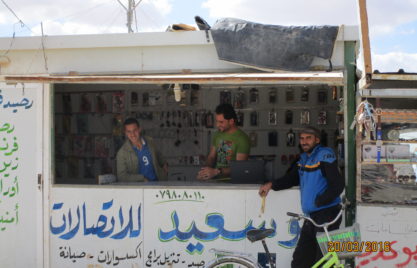The Central Bank of Jordan’s Ms. Maha Bahou, Executive Manager of Payments Systems Department, lays out the particular barriers to finance for the youth bulge in Jordan and indicates prospective solutions to reach out to the largely unbanked age group of 15 to 22-year-olds.
Amid promoting financial sector stability, economic and social development, the Government of Jordan and the Central Bank of Jordan (CBJ) aim for more inclusive, better financial services for all segments of the population. In a mission led by the Bank, public, private and civil society players are now joining forces to develop Jordan’s national financial inclusion strategy facilitated by GIZ to address the significant access to finance gaps for the youth, women, the poor and other vulnerable groups. Advocating for more convenient financial services, particularly savings accounts for the youth above the age of 15, which would allow them to meet future needs, to protect themselves from emergencies, or to become economically more active, Ms. Bahou in a policy proposal describes the following root causes for their financial exclusion:
- Legal restrictions: young adults are permitted to open a savings account or mobile wallet only above the age of 18. KYC and AML/CTF regulations impose strict restrictions.
- Stereotypes: policy makers and regulators seem concerned about the well-being of the younger clientele and the banks from a risk perspective due to a lack of confidence in them engaging with one another prudently, a view that is codified in the laws.
- Low financial capabilities of the youth and lack of incentives for service providers.
- Inadequate channels and products: inappropriate requirements, pricing, and proximity to access points vis-à-vis the financial behavior of youth characterized by small income, varying sources and irregular cash flows.
Aiming at enhanced capacities of young adults in smoothing consumption, protecting themselves and starting a business, Bahou makes three policy recommendations for the financial inclusion of youth in accordance with international principles and consumer protection aspects:
- Design of a youth-friendly regulatory and supervisory framework: The first recommendation requires the CBJ in collaboration with other public, private stakeholders to lower the age requirement for opening savings and transactional accounts (from currently 18 to 15 years) and the respective KYC requirements as well as to set industry standards for the provision of youth-friendly financial services.
- Design of tailored, sustainable youth savings products and channels: The second recommendation calls for market research about the socio-economic characteristics, needs, and preferences of youth and putting in place incentives for financial service providers to develop and roll out innovative, cost-effective products and delivery channels. Product development and marketing should take into account digital means to lower costs, the youth’s specific financial behavior and usage characteristics as well as fair client treatment principles.
- Conduct of youth-oriented financial literacy programs: Financial education programs, as they are already part of the 2015 national financial education strategy by the CBJ, the Ministries of Education and Planning, the banking sector and youth NGOs, shall be further implemented and scaled up to enhance the financial literacy of the youth.
Given the CBJ’s bold move to lead a consultative, comprehensive financial inclusion policy process on the national level, Ms. Bahou, referring to successful country cases, research findings and international principles, provides a proposal that holds promise to materialize for the financial inclusion of youth in Jordan. Read the policy proposal in full here.
By Atilla Kaiser-Yuecel – Amman October 3, 2016



